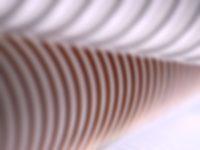
Material polyurethane (PU, PUR)
PUR is the ideal material for industrial hoses that have to transport highly abrasive or problematic media. Masterflex processes PUR into innovative hoses and connections.
General information about PUR
Polyurethane (colloquially PU, DIN abbreviation PUR) belongs to the group of plastics or synthetic resins.
It is polymer composed of a chain of organic units with carbamate (urethane) bonds. The term polyurethane is a collective term that stands for a large number of modern plastics. Their common feature is the urethane group and their incredible flexibility: the technical properties of polyurethanes, more than those of any other plastic, can be optimally adapted to the intended use by varying the starting materials.
Incidentally, Otto Bayer and his team at Bayer AG in Leverkusen developed PUR in 1937. Industrial production of polyurethane materials then began in 1940.
The use of PUR
The plastic polyurethane is versatile.
Polyurethane can be foamed - and is therefore very important in the foam industry as rigid or flexible foam. In the construction industry, rigid polyurethane foam is used for insulation, for example, but also as a self-solidifying foam for the permanent filling of cavities, such as cable and pipe penetrations. Foamed polyurethanes are also used as filling, insulation or insulating materials in mechanical engineering and the automotive industry. Flexible PU foam is used instead of rubber, caoutchouc and felts, for example, for upholstery and mattresses. Textile PU fibers are usually processed into fine textiles in combination with other fibers. Polyurethane is also the basis for weather-resistant paints, waterproof coatings, potting compounds and adhesives, which are used, for example, in the automotive industry, furniture construction and the textile and clothing industry.
The majority of our abrasion-resistant suction and transport hoses are made of polyurethane.
Properties of PUR
Polyurethane is the ideal material for industrial hoses that have to transport highly abrasive or problematic media. This is because the outstanding properties of PU hoses include
- high wear and tear resistance
- elasticity,
- temperature resistance,
- good resistance to ozone and weathering, and
- good chemical resistance.
Compared to conventional PVC hoses, they are characterized by increased strength and better temperature resistance.
Our hoses made of PUR material
The majority of our abrasion-resistant suction and conveying hoses are made of polyurethane (PUR):
- Flamex (in the versions B-F se, B-F se for machining centers, B se).
- Master-PUR Trivolution (in the versions LF, L, H, HÜ, HÜ S, HX, HX S)
- Master-PUR H Trainflex
- Master-PUR Performance
- Cargoflex
- Master-PUR Inline
- Polderflex PUR
- Master-PUR STEP
- Miniflex PU
Our PU hoses are characterized by their high internal smoothness and are thus particularly optimized in terms of flow, which results in lower abrasion and higher flow rates. For your production, this means: long service life of transport lines, less downtime, high process reliability - and lower costs.
The properties of PUR hoses from Masterflex
All Masterflex hoses made of polyurethane have some material-related properties in common. These include, for example, significantly greater abrasion resistance compared to rubber or soft PVC - measured according to DIN ISO 4649 (determination of abrasion resistance).
Many hoses made of PU also have a transparent hose wall. This allows users to keep an eye on the flow of material in the hose at all times and to detect possible faults at an early stage. In addition, our hoses made of PU contain neither halogens nor plasticizers.
When special PU formulations (so-called special compounds) are used, the hoses even meet the strict requirements of the FDA (U.S. Food and Drug Administration) as well as EU regulations 10/2011 and 2015/174. They are therefore approved for use in certain areas of medical technology as well as the food and pharmaceutical industries.
We can also upgrade the PU material by adding additives - and thus equip it with further, customized properties. For example, we use PU with specifically enhanced material properties in our Flamex hoses. These flame-retardant polyurethane hoses are type-tested to DIN 4102-B1 and meet the safety requirements of the German Timber Industry Association (BGI 739-2).








